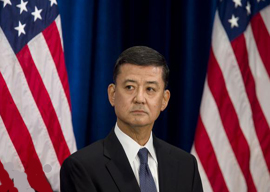
March 24, 2013

General Eric Shinseki
It’s been ten years since the Iraq War was launched. Back then, a few prominent individuals endeavored to thwart what is perhaps the greatest strategic mistake in United States history. Each stood against a country that was in widespread agreement over attacking Iraq.
Scott Ritter had opinions and the facts to back them up”always a dangerous place in government. Ritter worked as weapons inspector in Iraq from the years 1991 until 1998, when he resigned due to institutional failure to make effective progress in assessing the situation.
Soon thereafter Ritter published a book and appeared in a documentary where he urged the United States to continue conciliatory dialogue with Iraq while operating in conjunction with United Nations sanctions to constrain that nation until the true state of its WMD was ascertained. He repeatedly stated that armed conflict would not provide an acceptable resolution.
Throughout the flailing occupation, Ritter continued to denounce the military option. His beliefs were often bolstered by practical experiences.
Recently he has been convicted of unseemly charges of seduction of a minor through the Internet; similar charges were also levied against him in 2001, which coincided with the commencement of his antiwar appearances. Ritter claims that authorities seeking to punish his recalcitrance entrapped him. Given oddities which surround the strange fates of those who challenged the Iraq narrative leading up to war, it would not be surprising.
Army Chief of Staff General Eric Shinseki publicly put his reputation on the line when he testified before Congress prior to the invasion that the force needed to pacify a conquered Iraq would require “something in the order of several hundred thousand soldiers.” He was forcefully denounced across the news spectrum by both conservative and progressive outlets.
Shinseki had already engaged in heated debates on this very subject with then-Defense Secretary Donald Rumsfeld numerous times. This had also brought him into conflict with another architect of the war, Deputy Secretary of Defense Paul Wolfowitz. These were two of the most powerful men Washington, DC has seen in a generation. Shinseki knew what it meant to tell the truth, yet the man felt the issue was important enough to make personal enemies of both.
Others eventually admitted the wisdom of Shinseki’s estimation, but by then it was too late.
Brady Kiesling, John H. Brown, and Ann Wright were all career diplomats in the US Foreign Service with more than 55 years of combined service at the time they resigned in protest preceding the Iraq imbroglio. Each gave up secure positions to avert the blunder they recognized was coming.
Joseph Wilson was a former diplomat sent to Niger to discern whether accusations that Saddam Hussein was attempting to purchase yellowcake uranium were accurate. After meeting with dozens of officials and others inside the theater, Wilson became convinced it was highly doubtful any of these claims were factual. However, this did not deter President George Bush from stating the opposite during his 2003 State of the Union speech in what became known as “the 16 words.”
Wilson soon thereafter penned an opinion article for The New York Times in which he accused the administration of exaggerating claims against the targeted nation. As a consequence both Colin Powell and CIA Director George Tenet denounced Wilson.